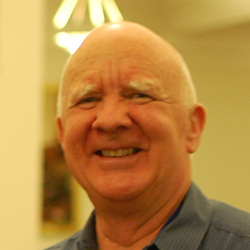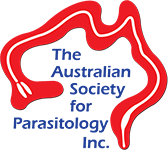David Emery has made an outstanding contribution to parasitology and parasite immunopathology through his extensive scientific publications, his role as a teacher at the University of Sydney and his role within the Society.

Citation
David Emery has published 135 papers in refereed journals and ten book chapters across a wide range of parasitological and immunological topics. David graduated from the University of Sydney with BVSc, but his early interest in research was sparked through completion of BSc (Vet) during his veterinary degree program. David’s genuine interest in immunology led him out of veterinary practice to complete his PhD in transplantation immunology and immunopathology at the Australian National University. David soon recognised the opportunities that infectious agents such as Theileria provide for understanding the of cell-mediated immune response while working at ILRAD (International Laboratory for Research on Animal Diseases) in Kenya on Theileria and Trypanosoma. David’s curiosity led him to repurpose his transplantation experience to mix and match Theileria infected and uninfected lymphocytes. Soon, David had discovered the major immune response mechanisms in cattle that recovered from East Coast Fever (caused by T. parva) and rechallenge with the homologous isolate of T. parva. Due to David’s early work in enabling vaccine development for East Coast Fever, it is quite poignant, that David is now leading research into Australian Theileria research and vaccine opportunities funded by major industry bodies.
On his return to Australia to the CSIRO Division of Animal Health, his initial research was on footrot in sheep before switching to immunoparasitology and publishing numerous papers on the immunity to ruminant nematodes and vaccination. David’s critical contributions were in the demonstration of immunological mechanisms during trickle infection of neonates with Haemonchus contortus and Trichostrongylus colubriformis. David’s emphasis was on maintaining animal models and experimental facilities for the development of novel surgical approaches to enable the study of ovine mucosal immunity and the development of reagents for the assay of ovine cytokines and mediators involved in innate and acquired immune responses. He also investigated the responses of the peripheral and mucosal immune systems to a comprehensive range of vaccine delivery systems, ranging from recombinant subunit moieties in a range of adjuvants to DNA, live attenuated vectors and slow, sustained release devices and participated as program manager in the CRC for Vaccine Technology.
In 2002, he joined the Faculty of Veterinary Science (now Sydney School of Veterinary Science, Faculty of Science) at the University of Sydney, initially as a senior research fellow and from 2004 as an Associate Professor then as Professor of Veterinary Immunoarasitology, the position he currently holds. During this period, he continued his research interest in resistance and resilience of livestock to internal parasites. David was the subprogram leader for the Host Resistance to Internal Parasites subprogram in Sheep Genomics within the University of Sydney funded by Meat & Livestock Australia and Australian Wool Innovation. At the University of Sydney, he forged a strong collaboration with Yarrandoo R&D Centre (Novartis Animal health later Elanco Animal Health), close to the Camden Campus of the University of Sydney, on Fasciola hepatica. David’s additional publications on diverse topics range from ticks, fleas, liver fluke and Theileria when it emerged as a problem in south-eastern Australia. He has also published 12 papers on the biology and taxonomy of cicadas.
The recent emergence of Theileria orientalis as a cause of serious illness in cattle allowed David to apply his past experience in an Australian context. Through collaboration with the Department of Primary Industries NSW, he defined the vector capacity of Australian arthropods to transmit the pathogen. Then, in collaboration with the Tick Fever Centre in Brisbane and support from Meat and Livestock Australia, Elanco Animal Health and Bayer Animal Health, led the way to demonstrate that immunisation of calves is a viable option to prevent or reduce the severity of the disease and production losses.
During his employment at the University of Sydney, he has also been active in coordinating research across institutions such as within the Sheep Genomics project and major industry initiatives including the potential for vaccines against gastrointestinal nematodes of small ruminants (B.AHE.0325) funded by Meat and Livestock Australia. As part of his activity, he has obtained grants worth more than $A3 million, managed in excess of >$A10 million and been involved in research culminating in three international patents.
Apart from undergraduate teaching in parasitology and immunology, and supervising 13 post-graduate students, he was also Pro-Dean in the Faculty of Veterinary Science from 2010-2014. Before then he was Associate Dean for Research in 2009 during which he implemented an agenda to align the Faculty of Veterinary Science with industry partners to improve opportunities for collaboration between the University and industry/stakeholder funding bodies. David has given over 120 scientific and technical presentations to a range of audiences from industry bodies, academics, farmers, students and the general public and has therefore played a significant role in outreach.
David has been a member of the society for many years, Treasurer from 1994-1995 and was President from 2015 to 2017. One of David’s most significant contributions to the Society was bringing the veterinary textbook to fruition. Although David insisted that all authors (and editors) be listed in alphabetical order, it was David who, over a six month period, devoted most of his time to getting the book finished and available for students from first semester the following year.
In view of his outstanding contributions to research and teaching in parasitology and his contributions to the Society, David Emery is an extremely worthy recipient of the title, Fellow of the Australian Society for Parasitology.


